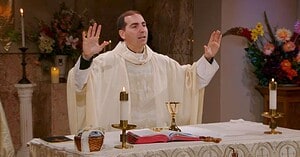Twenty-Ninth Sunday in Ordinary Time
Homily Video
Twenty-Ninth Sunday in Ordinary Time Homily Transcript
>>Our Lord- brilliant tactic he uses against the Pharisees and the Herodians in our gospel this morning. Real quickly, the Herodians and the Pharisees were opposed to each other. They were both Jewish.
Ah, the Herodians believed that the Jewish people should cooperate with the state. So they should work with the Romans, they should pay taxes, and it’s through cooperation with the state that Israel will be preserved. The Pharisees disagree with that. Ah, the Romans they see as evil, imposters, invaders- and should not cooperate with them. So the Herodians and the Pharisees are on opposite sides of each other, yet they unite fighting against Jesus.
It’s interesting how our Lord can bring certain groups together. So, they ask Jesus, “Should we pay taxes or not?”
Either way, Jesus it seems is in a lose-lose situation. He gives this brilliant response, “Pay unto Caesar what belongs to Caesar, what belongs to God to God.”
So, he’s saying: look, we can work with the state, which is fine, but we can’t neglect God.
So first, working with the state or working with the civil government, it’s interestingly in the first reading we hear Cyrus is called by the Lord ‘the anointed one.’ Now, Cyrus is king of Persia. Okay? So, he’s pagan and yet he’s called ‘the anointed.’ Really interesting, really confusing. God is using Cyrus, the secular government if you will, as his instruments. So, Cyrus is gonna be a key figure in allowing the Israelites to return to Israel after their exile. Okay? So, God is using this pagan completely secular ruler as his instrument. That’s why he’s called ‘the anointed.’ Alright?
But then, okay, so we work with the state. We cooperate. We follow the laws. We’re just people. But how are we doing in our justice towards God? Now, some theologians will call this the virtue of religion, our justice towards God.
Now every one of us answers this question I believe in their own personal way. So, think about yourself. Maybe do a little examination of conscience today. How are you doing in your relationship to God? Are you rendering unto God what belongs to God?
Now it could be very basic, like are you going to church? Are you praying each day? Do you offer petitions for your loved ones? Do you partake of the sacraments? Do you go to the sacrament of reconciliation? Okay. That would, I would say is very basic. Okay. And so, are you living a virtuous life? Are you doing the best you can? Being honest? Morally upright? Going about your job and your daily duties in a responsible way? Okay. That’s all being just to God. That’s one level. But I bet we can take it even deeper than that.
Okay. Are you being just to God on the deepest level of your soul? Now what does this mean?
Think about if you’re married or you have a best friend, what would it mean to be just to this individual, this loved one- your soul mate? I would say, it would be being vulnerable in front of this individual. Being authentic. Do you communicate with your spouse? Or your loved one? If you’re having a good day, if you’re having a bad day do you share that? If something’s bothering you, if you’re rejoicing at something do you relate that and do you listen to them when they try to do the same thing- to share their heart with you?
Okay. That’s one way we can be just. So, do we do that to God? Alright. Do we treat God as our spouse, as our loved one, the greatest love of our life? Are we vulnerable in front of Him? Do we share with Him how we’re doing? Do we really let Him into our souls? And do we spend time to listen to Him?
Now to listen to someone, we need to be silent. So do we put aside the things that distract us; like our phone, TV, whatever? So we can hear God speak in the depths of our soul. Cause Christ, brothers and sisters is our best friend. So let’s be just to God. And if we are just to God, if we give him our hearts, if we’re authentic to him then I guarantee you, from heaven, St. Paul and all the angels and saints will be saying what St. Paul said in our second reading,
“I give thanks to God the Father in heaven for you.”
Amen.
Discover More
Saints Peter and Paul, Apostles
June 29, 2025
The Most Holy Body and Blood of Christ
June 22, 2025
The Most Holy Trinity
June 15, 2025
Request Sunday Mass Guide
The Sunday Mass Guide sent to your home address
Spiritual nourishment and updates from the Sunday Mass community
Monthly reflections from Fr. Scott Donahue, our Principal Celebrant


